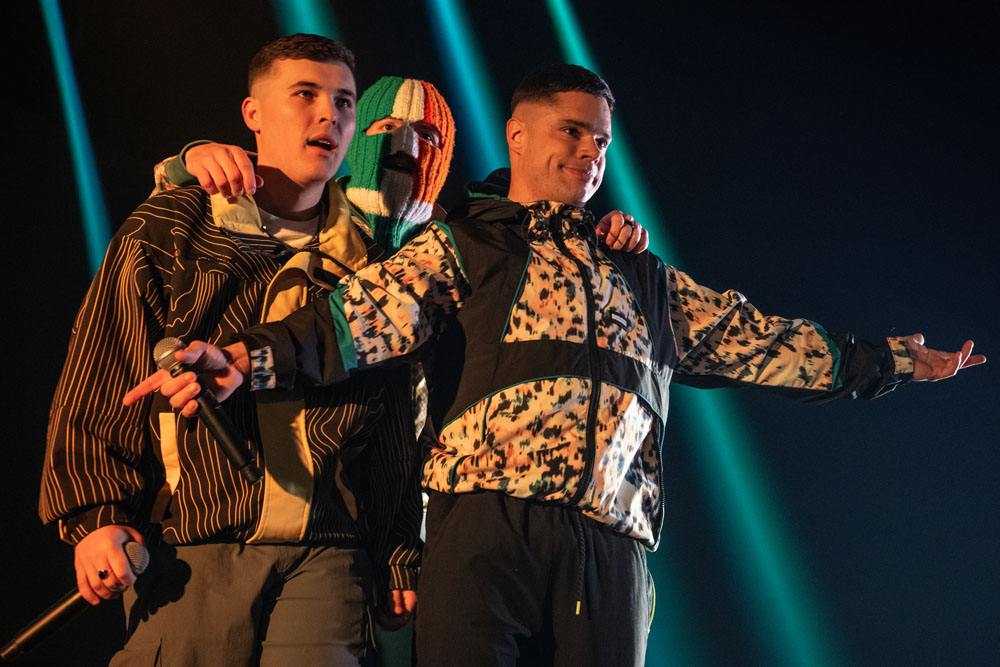“Sometimes change hits like a filthy baseline,” Móglaí Bap says in “Kneecap,” which to go by how many rhymes he can drop in the span of a few seconds suggests it’s coming to his native Ireland a lot sooner than anyone in the country could expect from its tortured history. Although his father (Michael Fassbender) has gone into hiding for rebelling against the RUC (Royal Ulster Constabulary) that patrolled Belfast during the Troubles, he continues to remember sitting at his knee when American westerns graced their television and was told he should consider the action from the indigenous point of view rather than the cowboys the camera would naturally follow and while making a film wouldn’t appeal to Móglaí with its bulky equipment, the idea of art sparking a revolution does and in his case, all it takes is a notebook to file some rap lyrics.
Some of this may not have happened in real life, but a lot of it did when Móglaí Bap actually started a band with Mo Chara and DJ Próvai — Kneecap —that took Ireland by storm because of their way with words, powerful and often irreverent history lessons about the desire for Irish independence that carry even greater resonance when expressed in the relatively little-used Irish language, one casualty of many due to British rule through the early 20th century. Their rebellious attitude comes through unabated when writer/director Rich Peppiatt taps into their anarchic energy — it’s telling that he dared to recruit Fassbender when the actor’s breakthrough role came from playing Bobby Sands in Steve McQueen’s “Hunger” (with a cheeky nod at one point when referred to as “Bobby Sandals”) — and watching the film now feels as if you could’ve been standing right next to him when he first discovered the band himself at one of their shows and knew he had movie stars in his midst.
Between the band being comprised of members of the first post-Troubles generation known as “ceasefire babies” and Peppiatt’s own directorial verve, the film has a fresh perspective on a country still fighting for its own identity from its colonial past, sharp and clear-eyed even when Kneecap is known to take their fair share of narcotics. (In the kind of move that made him a true compatriot, the director paid out of his own pocket for a Claymation sequence mirroring an experience with psychedelics, now one of the film’s signature scenes that never made sense otherwise its producers.) While the group makes its fair share of enemies in the film when butting heads with authorities in the madcap comedy, they have been earning more and more fans as the film has began making its way across the world, starting with its premiere earlier this year at the Sundance Film Festival and truly taking over Hollywood this past week when they arrived in Los Angeles (sans Mo Chara, who was under the weather), Peppiatt, Móglaí Bap and DJ Próvai spoke about making a movie that would keep the spirit of their music intact, connecting with other cultural and political movements around the world and going out in a blaze of glory.
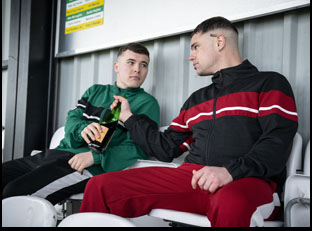
Móglaí Bap: To ignore him? [laughs]
You can take the question however you want.
Móglaí Bap: Well, obviously Rich is from England and we don’t hold that against him…
DJ Próvai: It’s not his fault.
Móglaí Bap: We don’t hold it against him… anymore. But at the start we did because of course the English profited off Irish labor for a long, long time, so we were quite hesitant and skeptical. But after a few pints at Guinness we warmed up to him and we became quite friendly. Eventually, we saw that Rich was very serious and had a vision for the movie. He organized acting classes for us and not only that, but Rich actually took part in all the acting classes with us and would play all the little games with us, which meant a lot. He was the worst at them…
Rich Peppiatt: On purpose, just to let them win and give ‘em the morale boost.
DJ Próvai: Obviously, Rich is so creative as well and sitting down and going through the stories and collaborating with him was so easy. You could have had somebody come in and he wouldn’t be listening to what you’re saying, but Rich was very perceptive of everything.
Móglaí Bap: That summed up the whole process of the movie. We were all in it together.
And my God, eventually we got through it andnow we’re in fucking Hollywood.
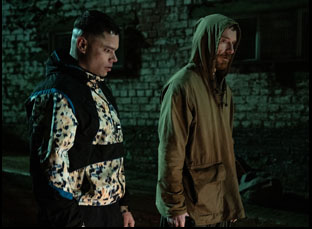
DJ Próvai: And Brad Pitt wanted to play me in the movie, but it’s just the script wasn’t tight enough. So they turned him down. That’s why we eventually had to play ourselves. Morgan Freeman asked to play Aisha. It didn’t work out in the end, so we just played ourselves.
I’m glad it turned out the way it did. Were there things that were important to the band when you committed to this?
DJ Próvai: Obviously, we were a band before we were actors and the movie could have been very detrimental to our musical careers if it had been cringier, so we were very conscious of that, making sure that everything that we do in real lifecomes across on screen. Rich would sometimes [say] “Do this here” and we were like, “Maybe that’s not what our characters would do” and we were the authorities on ourselves.
Rich Peppiatt: it’s a hard argument to make when someone tells you that they wouldn’t do that and it’s them [playing themselves].
Móglaí Bap: I’m sure Rich had a very hard job trying to give us any pointers on set because we just wouldn’t listen.
DJ Próvai: But that to and fro is what honed the film into what it was.
Móglaí Bap: Yeah, we’re going to do “Kneecap” the the play next, the drama.
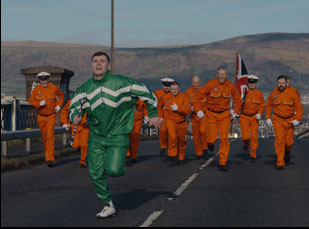
Móglaí Bap: We had obviously some of the older songs, like [for] the scene where I give the boys ketamine by accident instead of cocaine, which by the way, ketamine shouldn’t be consumed in that manner.
DJ Próvai: Or by humans.
Móglaí Bap: It’s mostly for horses. But we’ve discovered if you take enough of it, that it will make everything go backwards. But we produced and created [the accompanying song] “Sick in the Head” for the movie. And the montage scene of us going around in a circle creating that song with DJ Próvai on the 808, we had that specifically created for the movie. But obviously it’s following the trajectory of the band from its humble beginnings in 2018-19 to modern day, so there’s a lot of older songs intertwined.
Rich Peppiatt: The 808 was something we thought was important to get in [the film] because ultimately we wanted to really flag that hip-hop came about to give a voice to the African-American community in America who felt that they were being marginalized and their voice wasn’t being heard, and [the 808 accentuates this] idea of cultural appropriation in a positive way rather than a negative way. I think it gives people a kick to see see it taken out of the context they’re used to in America and instead transplant it to somewhere like Ireland and used to voice to give a voice to a voiceless community, exactly what the genre was invented for.
Rich, when you were doing these acting lessons with the band, were there group dynamics you could build on for the script or was it already pretty set in stone by then?
Rich Peppiatt: Sticking to the script was never part of the plan. It was [always] to allow it to feel free and to flow, so there was a degree of ad libbing [on set] and just allowing things to play out and I think that naturalism really helps the film feel authentic. Obviously, there’s certain lines need to be delivered in a certain way because they’re punchlines, but there’s other bits where they can be a bit freeform. Some of the funniest bits of the film is stuff that’s was randomly done on the day. That was always fun.
Móglaí Bap: Yeah, the scene in the garage when we’re all taking copious amounts of drugs, which I wouldn’t recommend to anyone, but a lot of that was just freestyling. Rich would share some ideas with us, but I think we had some music on in the background and we did 15 minutes of jumping about the place.
Rich Peppiatt: We’d run out of time. The day had ran over and it was like, “We need to get this scene and it was very early in the shoot. But the boys just went absolutely mental. We put on some Prodigy and it was all good. Our [director of photography] Ryan Kernaghan just absolutely smashed it, with a camera over the shoulder, just following them about as they were doing mad stuff. But you wouldn’t know from looking at it…
Móglaí Bap: It was a chaos.
Rich Peppiatt: Absolute chaos.
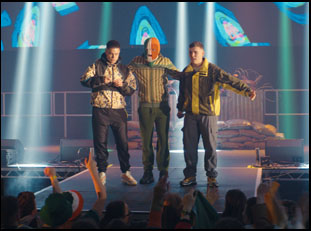
Rich Peppiatt: That was the craziest day, I’d say. The thing about that bridge is that it has the perfect “Lawrence of Arabia” cadence to it. We just had to have that be the bridge, but unfortunately there is the most one of the most fervent loyalist communities that lives under that bridge, so [we had to get] permission to do it and the council [said], “There’s no way. It’s just too dangerous. If they find out that Kneecap is filming on the bridge, it could get violent.” And I said, “I don’t care. That’s fine. Their lives are expendable.” [laughs] Yeah, but eventually we managed to convince them to let us [the scene at] 6 a.m. on a Sunday morning, the logic being that most people who might cause us physical harm would be asleep with a hangover. So we managed to get up there and shoot for a few hours. It was a crazy, crazy day, but we got it in the can. I remember sitting there at my monitor and just seeing, the mob running over the bridge and this bird flying in the background, perfectly choreographed…
Móglaí Bap: We trained the bird for like three months. [laughs]
Rich Peppiatt: There’s going to be an Academy Award for best flying bird.
A few months ago, I spoke to Colm Bairéad, the director of “The Quiet Girl,” who said how much pride he took in introducing the Irish language to the world and even many in Ireland as the film played there. What’s this experience been like so far for you?
DJ Próvai: Obviously, they were leading the way last year in the Oscars and a lot of the Irish actors were up for nominations as well, so this is a continuation of that success…
Móglaí Bap: Yeah, I think in Ireland there’s a bit of a resurgence in terms of music and film. We have some of the best and biggest bands in the world coming out of Ireland now — the Fontaines DC, Lankum, the Mary Wallopers and films are having a moment, and they’re getting accolades and awards, so I think people are starting to recognize that Ireland has all these skillful people. We’ve had some of the best music in here — Enya, maybe not Bono, but other types of music — and it [shows] there is something happening in Ireland culturally. We are just honored and privileged to be a part of that. And there’s so many other aspects of the culture that’s happening, folklore and traditional music and other aspects maybe you wouldn’t see on the same platform as us, but there’s a lot of pride in Ireland at the moment.
Rich Peppiatt: And beyond their music, the cultural impact that Kneecap has had and continue to have among people in Ireland is huge. There are thousands of people learning the language because they are fans of Kneecap. And even when I started learning the language back in 2019, the class I was in, half of them were there because they were fans of Kneecap, so that is a legacy which will outlast their artistic endeavors. And it’s very special. And we’re right at the cusp after six years of work of finally this getting out to a larger audience, so we’re so excited by that. It feels like we’ve been revving the engine with the handbrake on for a while now. And we just want to let it fly off the cliff and crash and burn in the water.
DJ Próvai: Yeah, It’s going to be a great ending. It’s a Bonnie and Clyde ending. Or a Thelma and Louise?
Móglaí Bap: Marge Simpson and Homer.
“Kneecap” opens on August 2nd. A full list of theaters can be found here.




